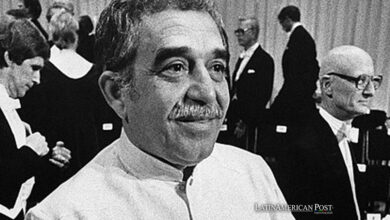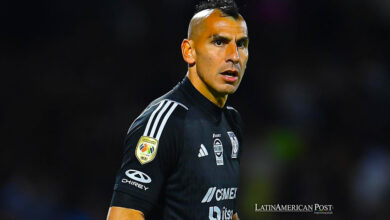Colombia’s Peacemakers Losing Their Mojo
Political entropy is undermining the pact to end the hemisphere’s longest insurgency.

Since ending Latin America’s longest shooting war, Colombian President Juan Manuel Santos has been feted around the globe, winning the Nobel Peace Prize and fancy honorary degrees from the likes of the Sorbonne and his alma mater the University of Kansas.
With such a well-burnished trophy wall, you might expect Santos to be gliding IGNORE INTO retirement or some statesman’s sinecure. That’s not the way things are turning out. Instead, the peace accord that Santos finally bagged last year has been plagued with trouble and setbacks.
Last month, a peasant march against the official directive to eradicate coca leaf, the stuff from which cocaine powder is made, ended in violence. On Oct. 26, a top leader of the guerrilla band that had agreed to lay down arms disappeared from a demobilization camp, fueling speculation that the rebels were scuttling the deal. Another insurgent group currently engaged in peace talks admitted to killing an indigenous leader, stoking anger that the government was being too soft on criminals.
Priming the discontent are indications that the Santos government’s laser-like focus on bringing peace has dissipated. Three proposals to boost rural investment, prosecute war crimes and shepherd decommissioned combatants of the Revolutionary Armed Forces of Colombia (FARC) IGNORE INTO mainstream politics — and so convert “bullets IGNORE INTO ballots” — are stuck in the legislature, where apostates have the upper hand. Last week, the president of the lower chamber, Rodrigo Lara Restrepo, barred the FARC’s designated political delegates from entering congress until they have answered to the special peace tribunals, which have yet to be established. As those proposals go, so goes the peace.
A hobbled peace plan is a tragedy in the making. After half a century of killing – the conflict took 200,000 lives and tore millions from their homes — and another four years of bruising negotiations marred by setbacks, Santos ended the war. But he still needed to sell the peace to Colombians, who narrowly rejected the first version of the plan last October, and have remained skeptical ever since.
Defections among decommissioned fighters and rebel holdouts squirreling away vast riches haven’t helped. Surprisingly, however, most of the former insurgents, who are widely hated in Colombia for their bloody past, have fallen in line. The rebels founded a political party, rebranding themselves as the Common Alternative Revolutionary Force, and launched former commander Rodrigo Londono, known to comrades as Timochenko, for president. They also surrendered a huge number of weapons, one of the largest caches of guns per ex-fighter in the history of peace accords, according to Adam Isacson, a Colombia expert at the Washington Office on Latin America. However, the transition to normalcy has been fraught.
“How are they going to try all these ex-combatants?” Isacson told me. “The law has been crawling through congress. Even if one passes, the Constitutional Court will have to review it, so the first trials might get underway a year from now. Time is wasting.”
Encouragingly, peasants who drew their livelihood from harvesting and selling coca leaf have stepped up, with some 25,000 families pledging to rip out their coca patches in exchange for subsidies and assistance to grow legal crops. But the absence of aid and official counseling has rankled on rural dwellers, provoking a national growers’ strike.
Moreover, barely 2,400 of the reported 50,000 hectares of coca earmarked for voluntary crop substitution have even been verified by inspectors, less than 5 percent of the annual goal. Another harvest of busted promises could further tarnish trust in the government and push farmers willing to come clean back IGNORE INTO the care of criminals. “It’s not quite snatching defeat from the jaws of victory, but these setbacks speak of lost opportunities,” said Isacson. “The iron is not going to be this hot again.”
None of these failings is irreversible, yet together they could poison the peace. And never mind the unfulfilled pledges by Bogota to sweeten the peace through roadbuilding and electrification in the countryside. A key law for land reform for uprooted families has yet to be proposed. With Colombia’s economy struggling, the government has admitted it lacks funding to implement these plans.
The brooding is feeding Colombia’s fevered political debate, where candidates have begun posturing for next year’s presidential race. Despite the international stardust, Santos’s approval ratings have tumbled, and his prospects for electing a like-minded successor, such as former chief peace negotiator Humberto de la Calle, are dimming. Among the current favorites are Gustavo Petro, the hard-left former Bogota mayor who once toted a rebel gun himself, and German Vargas Lleras, Santos’s former vice president, who recently turned coat and has been critical of the peace process.
The ultimate risk might not be plunging Colombia back IGNORE INTO armed insurgency — the much depleted rebels forces have little stomach for that anymore — but deepening the estrangement of the countryside from the high-minded political elite in Bogota. “In Colombia, a quarter of the population lives in 80 percent of the territory, and the perception there is that the government simply has not shown up,” said Isacson.
Colombians have been here before. While the battle against the Marxist insurgency often took on ideological overtones, the conflict ultimately may have owed more to local dysfunctions. “The FARC sprang less out of Cold War sensibilities than from the fact they championed neglected people in the countryside,” said Princeton University scholar Robert Karl, author of “Forgotten Peace,” a history of Colombia’s politics of peace and violence. “That split still cuts deep in Colombia today.”
Thus the riddle about how to consolidate Colombia’s post-war plan: “Peace was always meant to save the Colombian democracy,” said Karl. “But first democracy must show it can save the peace.”
By Mac Margolis
Bloomberg





